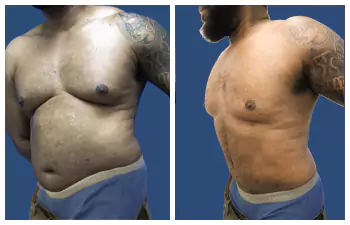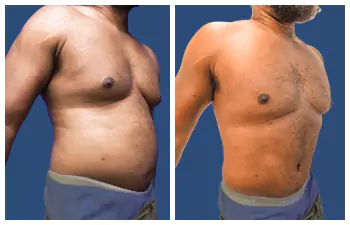Introduction: How much weight can you lose after liposuction?
Liposuction, the most popular cosmetic procedure, has been the beacon of hope for many aiming to achieve their desired body contour. But what does this procedure truly entail in terms of weight loss? The quick answer to this question is 7.7 pounds right after surgery, but you will have to read on to get the details. Let’s delve deep into the intricacies of liposuction and its impact on body weight and answer the question, “How much weight can you lose after liposuction?”
Liposuction: Beyond Aesthetic Appeal
Liposuction is not merely a cosmetic intervention; it’s a scientific approach to target and remove fat cells from specific regions of the body. While the procedure offers transformative results, it’s essential to understand its primary objective: body contouring and not significant weight loss.


The Weight Loss Spectrum of Liposuction
The weight loss post-liposuction varies among individuals. On average, patients may lose between five to eleven pounds of fat. However, it’s crucial to note that liposuction’s primary aim is not weight loss but the removal of stubborn fat pockets that resist diet and exercise.
The Role of Body Mass Index (BMI)
BMI plays a pivotal role in determining the amount of fat that can be safely extracted during a liposuction procedure. Surgeons use this metric to assess the patient’s health status and set realistic treatment objectives. It’s a safeguard to ensure patients neither start nor end the procedure underweight.
Vital Fat vs. Stubborn Fat
The human body comprises various types of fats. While some are essential for physiological functions, others, often termed ‘stubborn fat,’ accumulate in specific areas, marring the body’s contour. Liposuction targets this stubborn fat, ensuring the preservation of vital fats essential for overall health.
Factors Influencing Weight Loss in Liposuction
Several factors can influence the amount of weight you can lose through liposuction:
1. Treatment Area:
There are various liposuction techniques, such as tumescent liposuction, ultrasound-assisted liposuction, and laser-assisted liposuction. The method chosen can affect the amount of fat removed.
2. Technique Used:
There are various liposuction techniques, such as tumescent liposuction, ultrasound-assisted liposuction, and laser-assisted liposuction. The method chosen can affect the amount of fat removed.
3. Surgeon’s Expertise:
A skilled and experienced surgeon will ensure that the maximum amount of fat is safely removed, achieving the desired results without compromising the patient’s health.
4. Patient’s Health:
The patient’s overall health and safety are paramount. There’s a limit to the amount of fat that can be safely removed in one session. Removing too much fat can lead to complications.
5. Safety Limitations:
Today, strict guidelines have been established regarding volumes of infiltration and aspiration. General anesthesia liposuction cases utilize a 1:1 volume infiltration to aspiration. Today, the safe infiltration volumes established include 5L in the outpatient setting and up to 10L in the hospital setting.
These volumes transfer to approximately to 5L in the typical outpatient setting. The reality is that only a maximum of 5L of fluid aspirate which is a mixture of fat and tumescent fluid can be removed. When the fat removed is dense and compact, you can expect a limit of 70% of the fat aspirate to be fat.
As such, you can expect to lose approximately 70% of 5L of fat to be removed which equates to 3.5L of fat. Since fat has a density of 1g/ml, this equates to 3.5kg or 7.7 pounds! Now, whether or not you keep it off, depends on your post-liposuction lifestyle and dietary habits.
Post-Liposuction: The Body’s Adaptation
The body is a dynamic entity, continually adapting to changes. Post-liposuction, while the removed fat cells won’t regenerate, new ones can emerge if there’s significant weight gain.
Maintaining Results: A Lifelong Commitment
To preserve the sculpted results of liposuction, one must commit to a healthy lifestyle. This includes:
- Dietary Habits: Embracing a balanced diet rich in whole foods, fruits, and vegetables.
- Physical Activity: Engaging in regular workouts to keep the body toned and in shape.
- Lifestyle Choices: Avoid smoking and excessive alcohol consumption, which can adversely affect body composition.
The Return of Fat: A Myth Debunked
A common misconception is that the fat cells removed during liposuction can regenerate. While this isn’t true, weight gain can lead to the enlargement of existing fat cells and the formation of new ones. Thus, maintaining a stable weight post-procedure is paramount.
Areas of Treatment: Beyond the Abdomen
While the abdomen is a popular area for liposuction, the procedure is versatile, and approved for various body parts, including the arms, thighs, back, and even the face. This flexibility allows patients to target multiple problem areas in a single session, optimizing results.
Debunking Common Liposuction Myths
Misconceptions abound when it comes to liposuction. Let’s address some prevalent myths to provide clarity.
Age and Liposuction: No Direct Correlation
Age isn’t a determining factor for liposuction eligibility. What matters most is the individual’s overall health and the surgeon’s assessment of their suitability for the procedure.
Immediate Results: Setting Realistic Expectations
Post-liposuction, patients will experience swelling, bruising, and soreness. It’s essential to understand that the final results will manifest weeks or even months post-procedure, once the body has fully healed.
Liposuction: Not Gender-Specific
Both men and women can benefit from liposuction. The procedure is tailored to address the unique body contouring needs of each patient, irrespective of gender.
Choosing the Right Surgeon: Expertise Matters
For optimal results, it’s crucial to select a board-certified surgeon with extensive experience in cosmetic procedures, particularly liposuction.
Liposuction vs. Tummy Tuck: Making an Informed Choice
While both procedures aim to enhance the body’s contour, they cater to different needs. Liposuction is ideal for removing fat pockets, whereas a tummy tuck addresses excess skin and tightens the abdominal muscles.
In Conclusion
Liposuction offers a transformative solution for those seeking to enhance their body contour. However, it’s essential to approach the procedure with realistic expectations and a commitment to maintaining the results through a healthy lifestyle.
Remember that liposuction is not a weight loss procedure. Even though fat deposits will be eliminated through this fat removal procedure, poor dietary and lifestyle habits will result in the return of weight gain. Maintaining your goal weight is a lifelong journey that requires consuming a healthy diet and participating in regular physical activities.
